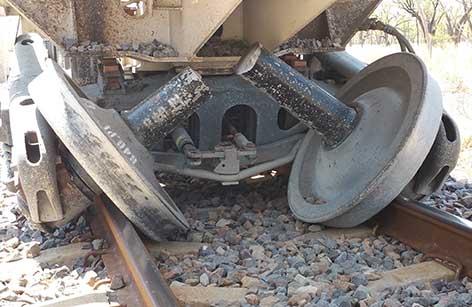A freight train tanker wagon derailment after an axle failure due to an overstress crack highlights the importance of inspection techniques that detect fatigue cracking prior to failure, an ATSB investigation has found.

The primary occurrence that initiated the investigation was the 28 September 2017 derailment of a freight tanker wagon near Kimburra, Queensland. The wagon was part of the 730 metre long train 9T90, which comprised two locomotives and 52 GATX freight tanker wagons with a consignment of about 1.67 million litres of sulphuric acid.
The train crew were initially unaware of the derailment as it had no noticeable effect on the performance of the train. After travelling approximately 1,300 metres, upon seeing sparks from the derailed wagon, the driver applied the brake to stop the train gradually. There were no injuries and only minor damage to the track and rolling stock. There was no spillage of the train’s consignment.
The ATSB also analysed a second derailment, on 15 August 2018, involving the same type of wagon, finding that both derailments were the result of axle failure.
During the ATSB’s investigation a review of past failures and defects identified that the axle type was susceptible to fatigue cracking due to relatively minor damage that was not reliably detected prior to failure.
Effective axle inspection techniques that detect cracking prior to failure are fundamental to rail safety.
Rail axles are designed to have an infinite life and axles with undetected fatigue cracks that propagate to failure will usually result in a derailment. Axles should be resilient to fatigue cracking from in-service damage, and the ATSB’s safety message from this investigation highlights that effective axle inspection techniques that detect cracking prior to failure are fundamental to rail safety.
Following the 15 August 2018 derailment, rolling stock operator Incitec Pivot Limited (IPL) proactively inspected their entire GATX wagon fleet. Those inspections detected 17 cracked axles, and they were removed from service. IPL has also increased the frequency of inspections for the axle type while it replaces them with an improved version.
However, the ATSB has issued a Safety Recommendation to Aurizon, the company which conducts the inspections, to address the lack of using standard test pieces for checking test equipment. The ATSB acknowledges that Aurizon have taken proactive safety action to address anomalies in their inspection procedures, but the use of standard test pieces is an integral part of the relevant Australian Standard.
As such, the ATSB considers it represents best practice.
Read the report: Derailment of acid train 9T90, near Kimburra, Queensland, on 28 September 2017


